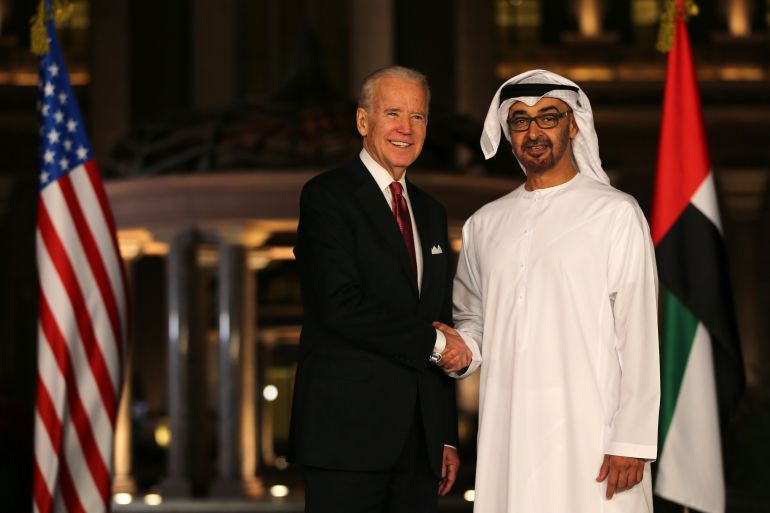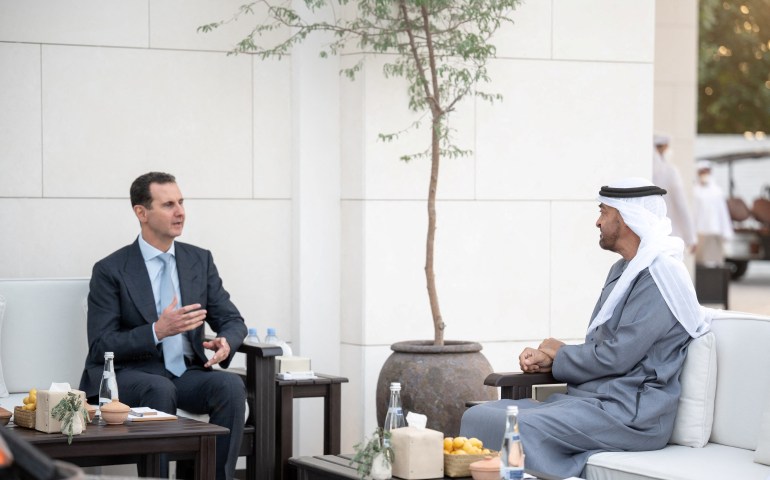Russia-Ukraine war shows cracks in US ties to Middle East allies
The UAE and Saudi Arabia are pursuing their own interests, analysts say, as the US urges a united front against Russia’s Putin.

Washington, DC – With Russia’s invasion of Ukraine dominating discussions around the world, the Biden administration has been promoting global unity against what it calls Russian President Vladimir Putin’s “war of choice”.
But despite those efforts, the conflict has highlighted cracks in some of the United States’ most prominent alliances in the Middle East, notably with the United Arab Emirates (UAE) and Saudi Arabia.
Keep reading
list of 3 itemsSyria’s Assad visits UAE in first trip to Arab state since 2011
Germany courts Qatar and UAE for alternatives to Russian gas
The latest manifestation of this apparent rift came last week when the UAE hosted Syrian President Bashar al-Assad despite repeated warnings from Washington against normalising ties with the government in Damascus. It was al-Assad’s first visit to an Arab country since the Syrian war broke out in 2011, and it came weeks after the Syrian president expressed full support for the Russian invasion of Ukraine.
“Al-Assad coming to the UAE, shortly after the Gulf Arab country voted to abstain from a UN Security Council resolution condemning the Russian invasion of Ukraine last month, tells us that the Emiratis are very serious about asserting their autonomy from the United States,” said Giorgio Cafiero, CEO of Gulf State Analytics, a Washington, DC-based geopolitical risk consultancy.
Abu Dhabi’s abstention last month from the US-backed United Nations Security Council proposal on Ukraine was followed by anonymously-sourced media reports alleging that Saudi and Emirati leaders rebuffed calls from US President Joe Biden. And last week, the Wall Street Journal reported that Saudi Arabia is in talks with China to ditch the US dollar in favour of the yuan to conduct oil transactions with Beijing.
The UAE and Saudi Arabia appear to be sending a message to the US, Kristian Coates Ulrichsen, a Middle East fellow at Rice University’s Baker Institute for Public Policy, told Al Jazeera: “‘We’re going to act upon our interests and not what you think our interests are.'”
Mounting tensions
The Wall Street Journal reported this month that Saudi Crown Prince Mohammed bin Salman – as well as Abu Dhabi Crown Prince Sheikh Mohammed bin Zayed Al Nahyan – had rejected calls from Biden. But the White House dismissed that report as “inaccurate” while the US has repeatedly stressed the importance of its relationships with Saudi Arabia and the UAE.
Cafiero noted that the UAE is not walking away from its relationship with the US, as Washington remains Abu Dhabi’s “security guarantor”. He added that the UAE enjoys a “very strong position in Washington”, especially after leading a push by Arab states to normalise ties with Israel via the so-called “Abraham Accords“.
“The leadership in Abu Dhabi is very confident that it can take steps that upset Washington, such as welcoming Bashar al-Assad to Dubai and Abu Dhabi, without having to pay a big price in terms of its relationship with the US,” Cafiero told Al Jazeera.
Washington issued rare public criticism of Abu Dhabi over al-Assad’s visit, however. US Department of State Spokesman Ned Price told the Reuters news agency on the weekend that the US was “profoundly disappointed”, calling the Syrian president’s trip an “apparent attempt to legitimise” his government.
Abu Dhabi’s push to normalise ties with al-Assad has been going on for years despite Washington’s protests. But the UAE’s main grievances with the US appear to be over Yemen, not Syria.
Missile and drone attacks by Yemen’s Houthi rebels on the UAE and Saudi Arabia intensified in January and February – and the Wall Street Journal, in its article on the allegedly rebuffed calls, reported that the Gulf nations had concerns about what they view as a “restrained US response”.
The US sent fighter jets and a guided-missile destroyer to help bolster Emirati defences in the aftermath of the attacks, while US forces in the UAE also said they helped intercept Houthi missiles aimed at an airbase where they are stationed in the country.
But the Emirati leadership has pushed the Biden administration to designate the Houthis as a “terrorist” group, a move that rights organisations have warned would worsen the country’s humanitarian crisis. A Saudi-led, US-backed coalition that included the UAE intervened in Yemen in 2015 to push back the rebels, who had taken over large swathes of territory, including the capital, Sanaa.
Annelle Sheline, a research fellow at the Quincy Institute for Responsible Statecraft, a US think-tank, said that despite the purported frustration from the Gulf countries, the Biden administration has backed Riyadh and Abu Dhabi against the Houthis, both in rhetoric and practice.
“From my perspective, this notion that the US isn’t doing enough to support what the Saudis and Emiratis are doing in Yemen just seems somewhat absurd,” she told Al Jazeera last week. “But I know that in particular, the UAE wants the US to redesignate the Houthis as a terrorist organisation.”
Global oil supplies
Despite these contentious issues, the Biden administration has said it intends to maintain and improve ties with its Gulf partners. White House Press Secretary Jen Psaki noted on March 10 that Biden spoke to Saudi Arabia’s King Salman in February and said “the president’s focus is really on our relationship moving forward”.
The Biden administration is almost entirely focused on the crisis in Ukraine, as the US and its allies have unleashed a flood of sanctions against the Russian economy, including the country’s energy sector. On March 8, Biden announced a ban on oil and gas imports from Russia, and several European countries have pledged to decrease their dependence on Russian energy supplies. The turmoil has sent petrol prices soaring across the US and the world.
The US has been calling for increased oil production to lower prices since last year – a push that became more urgent after Russia launched its all-out invasion of Ukraine on February 24. But the OPEC+ oil cartel, which includes Russia, Saudi Arabia and the UAE, said in early March that it would stick to its current production plans, touting a “well-balanced market” experiencing “volatility” due to “current geopolitical developments”.
On March 9, Abu Dhabi’s embassy in Washington expressed support for pumping more oil, but hours later the UAE’s energy minister wrote on Twitter that the country would abide by the existing OPEC+ agreement.

Ulrichsen said the UAE and Saudi Arabia appear to be acting as though they have leverage over Biden, given the domestic political implications of rising petrol prices in the US. He added that the US president’s troubled tenure so far – marred by low approval ratings, the chaotic exit from Afghanistan and an inability to pass major legislation – could be hardening the posture of Abu Dhabi and Riyadh.
“They may sense weakness,” said Ulrichsen. “And they may think that playing hard could get them more concessions. That could be part of the calculation.”
Cafiero said Biden is trying to avoid a hostile confrontation with Gulf partners as he prioritises uniting the US’s allies against Russia.
“The US is trying to bring more Arab states against Putin, and the US is trying to cooperate with oil-producing countries such as the UAE and Saudi Arabia, as the US and other Western countries deal with the impact of the war in Ukraine on energy markets,” he said. “Within this context, the Biden administration is not wanting a fight with either Abu Dhabi or Riyadh right now.”
Human rights
Beyond oil production and the crisis in Ukraine, the Biden administration, which pledged to put human rights at the centre of US foreign policy when it came into office in January 2021, has faced calls to pressure Saudi Arabia and the UAE to improve their rights record and end the Yemen war.
Democrats in Washington had been increasingly critical of ties with Riyadh, especially following the murder of journalist Jamal Khashoggi in 2018.
But last Wednesday, Price, the US State Department spokesperson, declined to condemn the mass execution of 81 people in Saudi Arabia in a single day. Instead, he said repeatedly that the administration is “continuing to raise concerns about fair trial guarantees” with the kingdom.
Meanwhile, the UAE’s Sheikh Mohammed bin Zayed Al Nahyan held a phone call with Putin last week. According to a Kremlin readout of the call, conveyed by Russian media, the Emirati leader “reaffirmed that Russia has a right to ensure national security”. In a separate statement, the UAE said Sheikh Mohammed told Putin his country would continue to coordinate with “concerned parties” to “help find a sustainable political solution to the ongoing crisis” in Ukraine.
Ultimately, the war in Ukraine has highlighted the fact that Washington’s Gulf allies are pursuing their own interests in a world where the US is no longer the sole superpower, said Sheline of the Quincy Institute.
“It makes rational sense for other countries to not rely so much on the US anymore,” she told Al Jazeera. “But then it’s irrational for the US to sort of unconditionally support these countries, especially when at crucial UN Security Council votes, they vote against what the US is trying to do.”
For his part, Cafiero said the US does not want to see its Gulf partners turn to Russia and China for support. “In a world that is becoming increasingly multipolar, these Gulf Arab countries have much potential to turn to other powers such as China and Russia to gain greater autonomy from the United States,” he said.
“Officials in Washington realise that trying to put too much pressure on some of these GCC [Gulf Cooperation Council] countries could result in them finding their partnerships with Beijing or Moscow to be more appealing.”